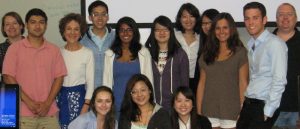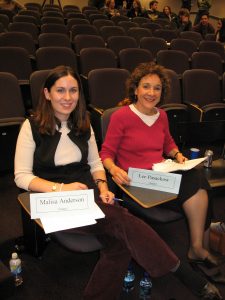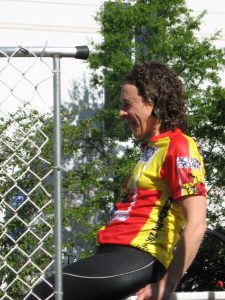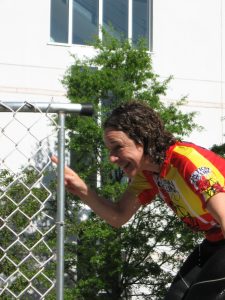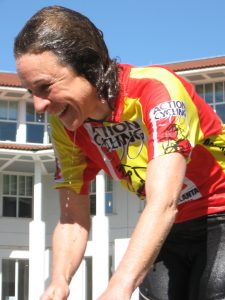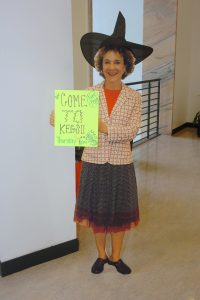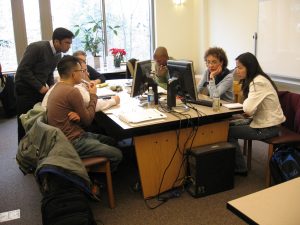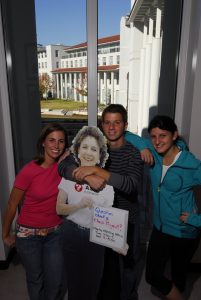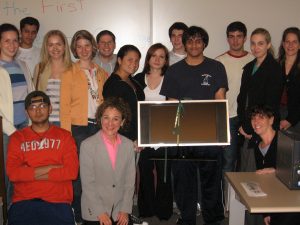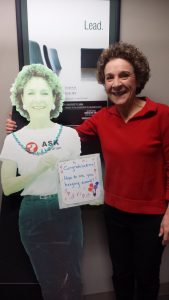 Business Librarian Lee Pasackow is retiring! For over a decade, Lee has made her mark at Goizueta as the librarian liaison to the BBA program and to the ISOM area. She took some time to share her experiences with colleague Saira Raza before her last day. While we’ll miss her tireless work and dedication to the business library and the Emory community, we’re incredibly happy to celebrate this milestone with her. And we will most certainly see her hanging around – not just as a cardboard cut-out, but in the flesh!
Business Librarian Lee Pasackow is retiring! For over a decade, Lee has made her mark at Goizueta as the librarian liaison to the BBA program and to the ISOM area. She took some time to share her experiences with colleague Saira Raza before her last day. While we’ll miss her tireless work and dedication to the business library and the Emory community, we’re incredibly happy to celebrate this milestone with her. And we will most certainly see her hanging around – not just as a cardboard cut-out, but in the flesh!
GBL: How long have you been working here? What are some impressions you remember from when you first started?
LP: I’ve been working here 12 and a half years. It’s a different space now (but I still don’t have an outside window in my office…haha!). The Business Essentials program existed, but it was on a smaller scale. So together with the program office, we expanded it and made it more of an integral experience. Before coming to Goizueta, I worked in a corporate library, and the biggest difference was the timeframes for completing projects. In corporate libraries, deadlines were typically by the next day, while here, deadlines tend to be by the next semester.
GBL: As the liaison to the BBAs, you’ve worked with thousands of students over the years who are just getting started on their road to the business world. What are some of your observations about what it takes to be successful in the BBA program and as a professional entering the workforce right after college?
LP: I think what is important is to get involved and take advantage of the opportunities you have at Goizueta and Emory, especially getting involved in clubs and study abroad. When I served on selection committees for scholarships, we looked for students that move outside of their comfort zone. I think this also helps them with the job search because if you’re just starting out, you don’t have a lot of experience, but you can tell them something interesting that you’ve done such as study abroad or a case competition or a leadership position in a club. By getting involved in these different things, you’re also networking and making contacts. You never know who you’re going to meet. And you’re also giving back to the community. This is a privileged university and there are lots of opportunities to give back.
GBL: Before you worked here, you worked as the librarian at PeopleSoft. What prompted you to make the shift from working in a corporate library to an academic library?
LP: I was somewhat familiar with Emory because I have friends who are professors and graduate students here. I thought it would be interesting to work in an academic environment to take advantage of all the learning opportunities. At PeopleSoft, I was based in Atlanta, but my team was in California. So I also thought it would be nice to work with a team in Atlanta.
GBL: Librarianship is actually your second career, correct? What were you doing before, and why did you decide to become a librarian?
LP: I started out as a community social worker in Israel. It was very challenging. My neighbor, who was American, told me about special libraries. After I investigated further, I decided to go to library and focus on special libraries. I was interested to being in the for-profit world, since I had already done non-profit. I thought librarianship would be an interesting way to get into the business world.
GBL: You are really involved in the Fulbright Association. When did you get involved and what drew you to it? What kinds of activities have you done with them over the years?
LP: Emory was having an information session, so I attended. I learned that librarians were eligible, so I was lucky that Susan [Klopper], the director of the library, endorsed it, and I was able to have a specialist grant. I went to Tukey in 2008, and when I got back in 2009, I got involved in the alumni association. I’ve served on the board, as president, and what we do is offer activities for the visiting scholars. It was a great opportunity to meet other alumni, promote Fulbright, and welcome the students and help them get adjusted to life in Atlanta.
GBL: You are also someone who puts a lot of time into helping others – you volunteer with voter registration, refugee assistance programs, and more. What drives you to engage in the community? What kinds of issues are important to you?
LP: As my cousin would say, I’m my mother’s daughter. My mother was always volunteering, and I think it’s important to do. I’m in a privileged position. I was lucky to come from a good home, but not everybody does. And I think if you have the resources that I was privileged to have, you can help other people succeed. Some people need that help because they don’t grow up in such a great environment. I did move down here from the North. And many northerners move here because of the weather. But I was afraid I wouldn’t be able to deal with the political climate, but now I see it as a place that has lots of opportunities to get involved in social change.
GBL: And now the big question: how will you spend your time after March 2!?
LP: At the end of the week, I’m joining a friend who is biking across the country, and I’m going to join him for two days biking across Florida. I have a whole list of volunteer NGOs that I’m going to investigate, and I want to get seriously involved in a couple of organizations. I plan to come to a lot of seminars at Emory during the day and take advantage all that the city has to offer. I’ll also spend quality time with family and friends.

